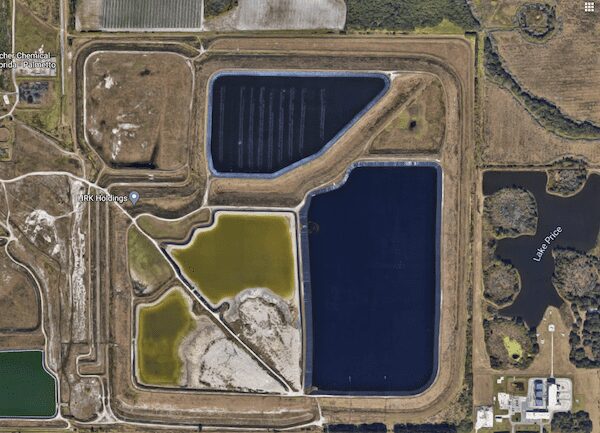PALMETTO – The Florida Department of Environmental Protection (FDEP) has issued a draft permit for Manatee County to build and test an underground injection well to store contaminated water from Piney Point under the Floridan aquifer, the state’s drinking water source.
The April 20 permit request by the Manatee County Utilities Department is for two wells at 3105 Buckeye Road – an injection well and a monitor well. Under the permit, issued Sept. 1, the injection well would be up to 3,300 feet deep and could be filled at the rate of up to 4 million gallons a day. The monitor well to test drinking water would be up to 950 feet deep.
A public meeting on the permit will be held on Wednesday, Oct. 6 from 4-7 p.m. at the Manatee County Central Library auditorium, 1301 Barcarrota Blvd. in Bradenton to give citizens an opportunity to comment on the draft permit, ask questions and obtain information.
Written comments also can be submitted to FDEP Aquifer Protection Program, 2600 Blair Stone Road, MS 3530, Tallahassee, Florida 33637-0926 by Oct 6.
Manatee County commissioners approved a $9.35 million agreement on April 20 – the same day as the permit request – for Tampa-based ASRus to design and build the deep injection well.
The permit, which makes the county liable for harm to human health or animal or plant life, also prohibits anything that “causes or allows movement of fluid into an underground source of drinking water,” which the permit states is located at about 900 feet deep at the site.
Should the injection well fail, the permit requires that current methods of water management resume, including trucking and piping the water off site. The removal of the contaminated water began after FDEP approved the emergency discharge of 215 million untreated gallons into Tampa Bay in March and April to avoid the potential collapse of the compromised south gypsum stack. The pond at the top of the stack then contained more than twice that amount of polluted water, which the state agency feared could flood the surrounding neighborhood.
Deep well injection “is one potential critical element of the necessary water disposal that will enable the ultimate closure of the Piney Point facility once and for all, eliminating the threat from this site to the environment and the community permanently,” according to an FDEP release.
Opposition to the well
Local environmental group ManaSota-88 asked the Manatee County Commission today to withdraw its application for the permit and place the issue on next week’s agenda for public discussion.
The group opposes the deep injection well on several grounds, including that wells are subject to failure, and that leaks of the contaminated water – which is also slightly radioactive – could poison the state’s drinking water.
“The operation of a deep well relies very heavily on predictions and good faith,” Glenn Compton, chairman of ManaSota-88, wrote the commission. “Deep well injection is done because liquid wastes that cannot be discharged into surface waters are injected into deep wells. Thus, the worst wastes end up in these wells. If a failure occurs, very little can be done to correct it. If an aquifer is contaminated, it’s too late.”
Compton also is concerned that changing conditions in the aquifer can allow wastewater to seep into the groundwater supply, and that detecting a leak in the system is “an inexact science.”
“There are no easy answers to getting rid of the radioactive and toxic wastewater at the former Piney Point Phosphate Plant, however, deep well injection is not a solution that should be considered,” he wrote.
ManaSota-88 is among five environmental groups that sued FDEP and Piney Point owner HRK Holdings LLC on June 24 seeking to hold both responsible for negligence in managing the site. No hearing has yet been set in the case.
A public meeting on the permit will be held on Wednesday, Oct. 6 from 4-7 p.m. at the Manatee County Central Library auditorium, 1301 Barcarrota Blvd. in Bradenton to give citizens an opportunity to comment on the draft permit, ask questions and obtain information.
Written comments also can be submitted to FDEP Aquifer Protection Program, 2600 Blair Stone Road, MS 3530, Tallahassee, Florida 33637-0926 by Oct 6.
Pond status
Water management at the site is ongoing. FDEP officials estimate that Piney Point will get at least another 7 inches of rain by the end of September. The current storage capacity for additional rainfall at the site is about 10.5 inches as of today. Totals are changing with rainfall amounts and water management activities at the site, including trucking water off site to the Manatee County Southeast Water Reclamation Facility to lower water levels; 228 trucks have hauled about 1,440,480 gallons of process water off site as of today. Contaminated water began to be piped to the North Regional Water Reclamation Facility on Sept. 2. About 263 million gallons remain in the pond, up from 256 million gallons on Aug. 28, the increase due to rainfall.
The state agency also is working with a contractor to remove nitrogen and phosphorus from the water in case another discharge becomes necessary. Since the April discharge, the water has been treated to remove about 200 tons of nitrogen and 150 tons of phosphorus. Both act as fertilizer for toxic red tide, which has plagued area waters since mid-April.
This week is the first that no red tide was detected in Manatee County waters since the discharge, although it remains in waterways in Pinellas County to the north and Sarasota County to the south.
FDEP Secretary Shawn Hamilton visited the Piney Point site on Sept. 1 to receive an update on the latest site conditions and meet with the new court-appointed receiver, Herbert Donica, a business lawyer and partner of the Tampa-based Donica Law Firm. Under the Aug. 25 court order appointing him, Donica is responsible for maintaining, managing and closing Piney Point “as efficiently and expeditiously as possible.”
FDEP sued Piney Point owner HRK Holdings LLC last month requesting an emergency hearing to appoint the receiver, concerned that heavy rains could overflow contaminated water ponds this summer.
Related coverage
No to deep well injection at Piney Point
Piney Point under new management
Rainfall could prompt second discharge at Piney Point
Florida DEP sues Piney Point owner
Conservation groups sue over Piney Point discharge
Piney Point-algae link explored
Piney Point spill leads to lawsuit
Piney Point pollution spreading, affecting dolphins
































